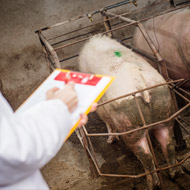Document compares pig welfare standards across the world

Still legally permitted in the US, Canada and Brazil, sow stalls were banned in the UK in 1999 and partially banned across much of the rest of the EU.
A new document that highlights the differing animal welfare standards put in place across the major pork-producing countries of the world has been published by the National Pig Association (NPA).
The Animal Welfare Matrix outlines the different welfare labelling schemes and legislative requirements in place across the UK, Denmark, Netherlands, Poland, Germany, Spain, the US, Brazil and Canada.
The document also includes Sweden because of its high animal welfare standards.
“When negotiating trade deals with third countries, it is vitally important that the UK pig sector is not undercut by imports of pork from countries with lower welfare standards. We must insist on equivalent standards,” said Georgina Crayford, NPA’s policy advisor.
“Equally, we are adamant the Government must not gold-plate our already high standards, as this would only risk pushing up costs and sucking lower standard imports in."
Key differences highlighted by the document include:
Sow stalls
Still legally permitted in the US, Canada and Brazil, sow stalls were banned in the UK in 1999 and partially banned across much of the rest of the EU.
Outdoor living/straw
In the UK, 40 per cent of sows are outdoors and 90 per cent of indoor sows and 60 per cent of finishing pigs are kept on straw. But very few, if any, pigs are kept outdoors or on straw indoors in the rest of the EU, apart from Sweden, or the rest of the world.
Use of antibiotics for growth promotion
This has been banned in the EU since 1996. Yet it is approved for use in pigs in the US, Canada and Brazil.
The document also draws a comparison between animal welfare labelling schemes in place in Denmark, the Netherlands and Germany. The NPA say that this is important because farming minister George Eustice is looking closely at tiered welfare labelling schemes elsewhere in the EU.



 The latest
The latest